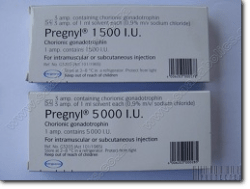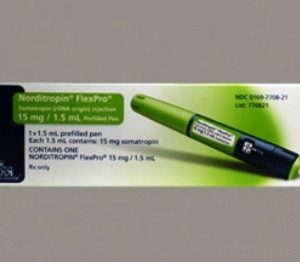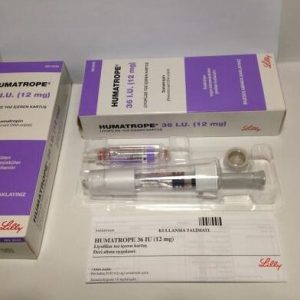USD28.00
Description
Active Life: 64 hours
Average Dose: Debatable
Water Retention: Yes
Liver Toxic: No
HCG Pregnyl 1500iu by Organon
HCG Pregnyl 1500iu is an post cycle steroid and is made by Organon. The active substance is Human Chorionic Gonadotropin.
HCG, is not an anabolic/androgenic steroid but a natural protein hormone which develops in the placenta of a pregnant woman. HCG is formed in the placenta immediately after nidation. It has luteinizing characteristics since it is quite similar to the luteinizing hormone LH in the anterior pituitary gland. During the first 6-8 weeks of a pregnancy the formed HCG allows for continued production of estrogens and gestagens in the yellow bodies (corpi luteum). Later on, the placenta itself produces these two hormones. HCG is manufactured from the urine of pregnant women since it is excreted in unchanged form from the blood via the womans urine, passing through the kidneys. The commercially available HCG is sold as a dry substance and can be used both in men and women. In women injectable HCG allows for owlation since it influences the last stages of the development of the ovum, thus stimulating ovulation. It also helps produce estrogens and yellow bodies.
Human Chorionic Gonadotropin (HCG) is a hormone produced in the placenta of the female body during the early months of pregnancy. It is in fact the pregnancy indicator looked at by the over the counter pregnancy test kits, as due to its origin it is not found in the body at any other time. Medically, human chorionic gonadotropin has been used for the treatment of undescended testicles in young males, hypogonadism (underproduction of testosterone) and as a fertility drug used to aid in inducing ovulation in women. In veterinary practices, it can also be used to rapidly induce ovulation, most often in cows and horses.
For male steroid users, HCG can mimic the action of luteinizing hormone (LH) in the body. Luteinizing hormone is a pituitary hormone that is released and signals the manufacture of testosterone in the testicles. It is this ability that enables the compound to help restore the normal function of the testes to respond to endogenous luteinizing hormone. This ability can be dramatically reduced after a long period of inactivity, as is the case when administering anabolic steroids. Even when the release of endogenous LH has been resumed to it’s normal levels, testosterone levels may not return to normal because of the extended time of inaction that the testes were exposed to.
Individuals will also often use HCG to combat testicular atrophy, a result of the hypothalamus pituitary testes axis shut down. While this atrophy is more of a symptom of a side effect of anabolic steroid use rather than something that can be dangerous to a user, many individuals are concerned about testicular atrophy and turn to human chorionic gonadotropin to help and alleviate it. For this purpose, HCG is quite effective.
As is fairly obvious by the preceding, human chorionic gonadotropin offers female athletes no performance enhancing qualities and is useless for this purpose.
HOW DOES IT WORKS?
Most athletes, however, use HCG at the end of a treatment in order to avoid a “crash,” that is, to achieve the best possible transition into “natural training.” A precondition, however, is that the steroid intake or dosage be reduced slowly and evenly before taking HCG Pregnyl 1500iu. Although HCG causes a quick and significant increase of the endogenic plasmatestosterone level, unfortunately it is not a perfect remedy to prevent the loss of strength and mass at the end of a steroid treatment. The athlete will only experience a delayed re-adjustment, as has often been observed. Although HCG does stimulate endogenous testosterone production, it does not help in reestablishing the normal hypothalamic/pituitary testicular axis. The hypothalamus and pituitary are still in a refractory state after prolonged steroid usage, and remain this way while HCG is being used, because the endogenous testosterone produced as a result of the exogenous HCG represses the endogenous LH production. Once the HCG is discontinued, the athlete must still go through a re-adjustment period. This is merely delayed by the HCG use. For this reason experienced athletes often take Clomid and Clenbuterol following HCG intake or they immediately begin another steroid treatment. Some take HCG merely to get off the “steroids” for at least two to three weeks.
Many bodybuilders, unfortunately, are still of the opinion that HCG helps them become harder while preparing for a competition by breaking down subcutaneous fat so that indentations and vascularity are better exposed. The HCG package insert states clearly that HCG has no known effect of fat mobilization, appetite or sense of hunger, or body fat distribution. HCG has not been demonstrated to be effective adjunctive therapy in the treatment of obesity, it does not increase fat losses beyond that resulting from caloric restriction.
Athlete should inject one HCG ampule (5000 I.U.) every 5 days. Since the testosterone level, as explained, remains considerably elevated for several days, it is unnecessary to inject HCG more than once every 5 days. The relative dose is at the discretion of the athlete and should be determined based on the duration of his previous steroid intake and on the strength of the various steroid compounds. Athletes who take steroids for more than three months and athletes who use primarily the highly androgenic steroids such as Anadrol, Sustanon, Dianabol (D-bol), etc. should take a relatively high dosage. The effective dosage for athletes is usually 2000-5000 I.U. per injection and should as already mentioned be injected every 5 days. HCG should only be taken for a 4 weeks maximum.
If HCG is taken by male athletes over many weeks and in high dosages, it is possible that the testes will respond poorly to a later HCG intake and a release of the body own LH. This could result in a permanent inadequate gonadal function. Cycles on the HCG should be kept down to around 3 weeks at a time with an off cycle of at least a month in between. For example, one might use the HCG for 2 or 3 weeks in the middle of a cycle, and for 2 or 3 weeks at the end of a cycle. It has been speculated that the prolonged use of HCG could permanently, repress the body own production of gonadotropins. This is why short cycles are the best way to go.
SIDE EFFECTS:
As noted earlier, the primary risk associated with human chorionic gonadotropin is causing testicular desensitization and damage to the Leydig cells of the testes resulting in permanent impairment to natural testosterone production. It is the aromatase activity that occurs with HCG that some feel is actually toxic to the Leydig cells of the testes. If this sceanrio plays out an individual would be causing permanent damage to their natural testosterone production (hypogonadism). This is why relatively small doses of the compound should be administered at a time. If large doses are taken it is likely that some damage may occur.
One way to minimize the risk of permanent damage is to use tamoxifen throughout the administration of HCG. Studies have shown that human chorionic gonadotropin can, at least partially, block the conversion of 17 alpha-hydroxyprogesterone (17 OHP), which is a testosterone precursor, to testosterone. Obviously this is something that a user would want to avoid. However tamoxifen has been shown to protect against this effect quite effectively. Therefore, it would appear that by using tamoxifen while running HCG a user could help to ensure that desensitization of the testes does not occur. However, it should be noted that if a user is not running large amounts of human chorionic gonadotropin desensitization should not be an issue and tamoxifen would be unnecessary. Despite this, for those users that administer large amounts of HCG it is advisable that they also use tamoxifen for this reason.
Due to the fact that there exists luteinizing hormone and human chorionic gonadotropin receptors in various tissues in the body other then gonadal, this indicates that human chorionic gonadotropin can have an effect on these tissues resulting in possible negative side effects when administered. Such case of this is the possible development of gynecomastia in users. It appears that the use of human chorionic gonadotropin in a small number of users has resulted in some men developing gynecomastia that is not related to their estrogen levels or increased levels of prolactin, the most obvious causes of gynecomastia in steroid users. Rather, in a very small minority of users it seems that the increased amount of circulating luteinizing hormone or the human chorionic gonadotropin itself can interact with these receptors in the breast tissue causing a reaction resulting in the development of gynecomastia. It is unknown at this time the actual mechanism by which this is accomplished, but it does appear to occur frequently in a small number of men. As well there is no known method to combat this side effect in men who experience it, leaving the only option to treat this effect the cessation of human chorionic gonadotropin administration altogether. Fortunately it appears that when this is done the gynecomastia that has developed begins to dissipate rapidly and becomes unnoticeable within a matter of days or weeks in the majority of cases.
So knowing that the ability of the testes to aromatize androgens could potentially be heightened several times greater than normal when using HCG, it is fairly obvious that it should only be used as a quick stimulus to the testes and not something that is used to constantly barrage them in an attempt to keep them functioning. If used correctly the compound is capable of aiding in recovery of natural testosterone production post-cycle, but like all compounds it’s use must be tempered with the correct knowledge and application.




